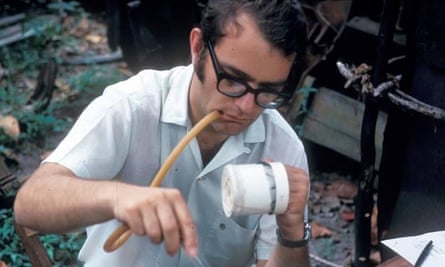In his ebook The Doubly Inexperienced Revolution (1997), Gordon Conway, who has died aged 85, describes visiting a tiny farm in Kakamega, in western Kenya. On solely 1 / 4 of a hectare – 50 metres sq. – he counted 30 totally different species of helpful plant, plus a calf and a cow: maize, beans, cassava, bananas, greens, grasses, totally different bushes and even an space of weeds. Inhabitants stress had pressured the subdivision of land, however Gordon argued that this had fostered intensification and innovation, leading to a wealthy, ecologically various and sustainable farming system.
Innovation, intensification and sustainability had been themes that impressed Gordon’s work on agricultural growth for greater than half a century. As an agricultural ecologist, he was primarily within the bodily facets of sustainability: within the means of various cropping techniques to maximise output, but in addition maintain soil fertility and resist shocks similar to drought.
Geared up with a diploma in tropical agriculture from the College School of the West Indies, Trinidad (1961), he spent the subsequent 5 years endeavor entomological analysis in North Borneo, which in 1963 turned the Malaysian state of Sabah. His work there helped cocoa farmers cut back dependence on dangerous and costly pesticides: when the spraying stopped, the pure predators re-asserted themselves, and the younger bushes prospered.
Humanist in outlook, Gordon was an early advocate of fascinated about sustainable livelihoods, constructing on concepts developed by Robert Chambers on the Institute of Growth Research, based mostly on the College of Sussex.
Of their much-cited paper for the IDS, Sustainable Rural Livelihoods: Sensible Ideas for the twenty first Century (1992), Robert and Gordon constructed a mannequin that emphasised the capabilities of rural individuals and the necessity for fairness, alongside each bodily and social sustainability.
They got here up with themes which can be simply recognisable in the present day: the significance of resilience, the necessity to consider future generations and the problem to the wealthy to scale back their consumption of the world’s pure sources.
“For the richer,” they wrote, “the precedence is to make decrease calls for on the setting. If the wealthy make decrease calls for, extra is left for the poor and for future generations.”
Born in Birmingham, Gordon was the elder of two sons of Thelma (nee Goodwin), a geography instructor, and Cyril Conway, an engineer. The household moved to Richmond, south-west London, and Gordon went to Kingston grammar college. His first ardour was entomology, and his bed room was filled with specimen bins containing moths, butterflies and beetles.

From Kingston Polytechnic (now Kingston College) he went to the College School of North Wales, Bangor (now Bangor College), the place he gained a BSc in ecology (1959), adopted by a diploma in agricultural science (1960) at Cambridge. After Trinidad and Sabah he took a PhD (1969) on the College of California, Davis.
In 1970 he joined Imperial School London, then a part of the College of London. In 1977 he turned director of the Centre for Environmental Expertise, based mostly at Imperial, and from 1980 its chairman and professor of environmental expertise. He directed the sustainable agriculture programme on the Worldwide Institute for Surroundings and Growth (1986-88) in London, after which went to New Delhi for the Ford Basis (1989-92) to advertise its human welfare targets by managing programmes in India, Nepal and Sri Lanka.
As vice-chancellor of the College of Sussex (1992-98) he helped set up the Brighton and Sussex medical college; he additionally chaired the IDS. The primary non-American to function president of the Rockefeller Basis (1998-2004), then with an endowment of greater than $3bn, he led its programme and helped launch work on HIV/Aids.
He had advisory roles with worldwide organisations together with the Agriculture for Impression programme funded by the Invoice & Melinda Gates Basis, and the Consultative Group on Worldwide Agricultural Analysis, a global umbrella organisation whose analysis centres in numerous nations pioneer new varieties and agricultural methods in wheat, maize, rice and different crops.
He continued this work into his 80s, and helped form coverage on agricultural growth in a world with rising inhabitants and growing environmental stress.
He additionally served as president of the Royal Geographical Society (2006-09), was elected a fellow of the Royal Society in 2004 and was knighted in 2005. That 12 months, too, he returned to Imperial as professor of worldwide growth, and joined DfID as chief scientific adviser, supporting its work in the direction of the UN’s millennium growth objectives.
He additionally chaired the Runnymede Belief Fee on British Muslims and Islamophobia, whose report Islamophobia: A Problem for Us All was revealed in 1997.
Gordon was a sort good friend and colleague, an inspiring speaker and instructor. He cherished journey, movies and music, and the roses in his Sussex backyard.
In 1965 he married Susan Mumford, a scholar of tradition, arts and crafts in Thailand and Myanmar. She survives him, together with their youngsters, Simon, Zoe and Kate.














